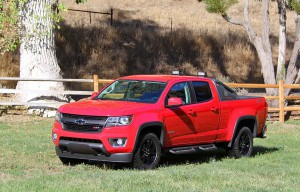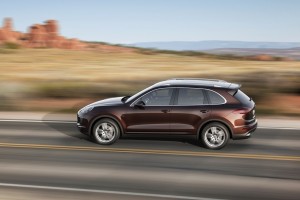Not so fast. When General Motors asked the Environmental Protection Agency to issue its official fuel economy rating on the new Chevrolet Colorado Duramax diesel pickup, the agency took a little longer than expected, EPA officials asking if they could keep the test truck a bit longer than normal, says Mark Reuss, GM’s global product development chief.
The EPA is taking a much more careful approach when it comes to testing for emissions and fuel economy, Reuss and other industry officials tell TheDetroitBureau.com. And U.S. regulators are not alone. Germany’s Federal Motor Transport Authority says it will run new tests on dozens of vehicles sold in that country to ensure they comply with diesel emissions standards.
Those moves come in the wake of revelations – first announced by the U.S. EPA on September 18th – that Volkswagen AG had cheated on emissions testing for vehicles equipped with the maker’s 2.0-liter EA 189 diesel engine. A total of 482,000 of those vehicles were sold in the U.S., 11 million worldwide. Since then, VW has admitted to other emissions “irregularities.”
The VW scandal is “not a good reflection on the industry,” Reuss says, quickly adding that GM has not broken the rules with its own diesel products.
(EPA gives Chevrolet Colorado Duramax diesel 31 mpg Highway rating. Click Here for more.)
There has seen a small but steady expansion in the number of diesel-powered vehicles offered in the U.S. market in recent years, though the bulk of them are sold through European brands – so-called “oil burners” accounting for 25% of the total sales for Volkswagen of America.
But domestic brands are slowly expanding their own diesel offerings, Fiat Chrysler adding an EcoDiesel version of its Ram pickup, GM introducing new diesel variants of the Chevy Colorado and GMC Canyon trucks and the Chevrolet Cruze sedan.
The EPA is expected to take a much closer look to ensure that manufacturers aren’t hiding technology intended to let them game the system. VW used a so-called “defeat device,” special software design to detect when one of its diesels was undergoing testing to temporarily reduce emissions of smog-causing oxides of nitrogen.
The U.S. agency has already accused VW of cheating on additional models, up-market vehicles using a 3.0-liter diesel sold by the Volkswagen, Audi and Porsche brands. While the German maker insists it did not violate regulations with a system it claims actually improves emissions system performance at low temperatures. A final analysis is underway by the EPA.
But VW officials did admit last week that an internal investigation has uncovered “irregularities” involving at least 800,000 more vehicles. Engineers have conceded they took a variety of shortcuts in order to meet the aggressive emissions mandates set by recently ousted Volkswagen AG CEO Martin Winterkorn.
(VW giving $1,000 in gift cards, vouchers, to its diesel owners. Click Here for the latest.)
In recent weeks, European media have been abuzz with reports that other automakers have also cheated on emissions tests, both for NOx and carbon dioxide, the European Union implementing the world’s toughest CO2 mandates.
So far, no manufacturer but VW has actually been shown to be in violation though, as TheDetroitBureau.com recently reported, European diesel products almost all exceed test emissions levels substantially in real-world use – something not technically a violation of the law.
But the German transport agency, the Kraftfahrt-Bundseamt, or KBA, wants to take a much closer look. It is running new and more thorough tests on 50 diesel models from 23 different German and foreign automotive brands.
“Since the end of September KBA has been investigating whether further manipulation of emissions, of nitrogen oxides in particular, is taking place in the market,” the agency said in a statement.
While the KBA wouldn’t disclose the specific vehicles under review, it said the list of brands includes BMW, Chevrolet, Fiat, Ford, Honda, Jeep, Land Rover, Mercedes-Benz, Porsche, Renault, Toyota and Volvo, as well as Volkswagen.
So far, two-thirds of the tests have been run and an initial review of raw data indicates elevated levels of NOx “in some cases,” according to the agency. Whether that will hold up under more complete analysis is uncertain, and a violation does not automatically mean a manufacturer was knowingly cheating.
Officials in both Washington and Europe have indicated that they will be taking steps to ensure that they can detect hidden steps meant to fool conventional testing procedures. In VW’s case, the 2.0-liter EA-189 engine was programmed to detect when a vehicle was being operated on a dynamometer. Among other things, that meant there was no steering input and the vehicles were running in a carefully controlled room with set temperature and barometric pressure.
Going forward, some regulators have suggested they want to find a way to test for emissions under real-world conditions, something that could prove far more challenging, experts warn.
Emissions aren’t the only things regulators are looking closely at. Several automakers, including Hyundai, Kia and Ford, have been fined in recent years for misstating their fuel economy numbers — which are generally developed by the makers using their own labs and EPA testing procedures. Going forward, industry officials say, self-certification may be barred, with either the EPA or third-party labs taking over testing duties.
(More VW execs head for the exits as emissions cheating scandal grows. Click Here for the latest.)



As noted on 11-10-15 after an extensive investigation, the German motor authority KBA has publicly stated there is no illegal software code in the VW 3.0L V6 diesel engines. That means the EPA’s prior accusations of a “defeat device” are going to be under extreme scrutiny by the auto industry as well as those in the legal and financial communities after the EPA’s false allegations regarding the 3.0L V6 diesel engines have caused billions of dollars in financial losses to investors, car dealers and potentially VW/Audi/Porsche owners from the false claims of the EPA. To be perfectly clear there is no “defeat device” on the VW 3.0L V6 diesel engines – as VW advised the EPA from the very beginning of the four cylinder diesel investigation. There is no illegal code/software in the VW 3.0L V6 diesel engines as independently confirmed by the KBA motor authority of Germany (and reportedly others).
You can bet the longer the EPA delays a public statement on the VW 3.0L V6 diesel engines indicating that the EPA was wrong and their accusations were unfounded, the higher the legal damages the EPA will be held accountable for. Not only is the EPA’s false accusations embarrassing they are incomprehensible when industry experts as well as VW explained that the supplemental system used on the VW 3.0L V6 diesel engines actually is a CAT heating/cleaning cycle that lowers cold start exhaust emissions lower than auto makers are required to meet. For VW’s engineers going above and beyond existing emissions regulations to actually lower exhaust emissions the EPA has cost VW, investors, car dealers and VW/Audi/Porsche owners billions in financial losses while blatantly slandering VW.
Amazingly with Obama’s new Facebook page talking about the environment, he failed to mention the EPA was so wrong in their exhaust emissions accusations against VW regarding the 3.0L V6 diesel engines. Birds of a feather…
You are joking. Please understand the German version of this engine including software tested are different from the EPA test version. This is the same protocol as other engines in the VW family. Now that the defeat software is revealed the EPA and its partners are batting1000. Of the KBA totally missed the boat on previous VW cheating and is now attempting to lead from behind.
Now that the defeat software is revealed the EPA and its partners are batting1000. KBA totally missed the boat on previous VW cheating and is now attempting to lead from behind.
Nikko-
The EU and U.S. emissions regs both ban “defeat devices”. There is no defeat device in the VW/Audi/Porsche 3.0L V6 diesel engines as VW advised the EPA before the EPA made their incorrect claims public to the contrary.
The EPA did NOT discover the VW four cyl. diesel engine irregularities as you believe. Researchers who wanted lower NOx for Europe in addition to the low CO2 emissions required in Europe discovered that the EA 189 diesel engine irregularities and reported them to the EPA. The so called “defeat device” on the EA 189 engines which is software code that assumes an emissions test is being conducted based on sensor inputs is illegal.
If you’re keeping score the EPA is zero, the independent Euro/University researchers are 1, VW is 1 and the EPA clueless talking heads look like bumbling idiots. This is going to be a costly mistake for the EPA and I’ll bet heads will roll at the EPA as the lawsuits from investors, VW/Audi/Porsche new car dealers and owners mount from the massive damages the false EPA claims against the VW 3.0L V6 diesel vehicles, have caused.
The VW 3.0L V6 diesel engine does not have any “defeat device” according to multiple industry experts who have examined these engines. What the EPA claimed was a “defeat device” is a CAT high temp cleaning cycle used by numerous engine makers and is fully compliant with all emissions regulations. The EPA’s failure to understand the VW auxiliary CAT cleaning process that actually lowers emissions on cold starts below what is required by law, is inexcusable.
To make public allegations against VW on the 3.0L V6 diesel engine after VW fully cooperated with the EPA and explained to them there was no “defeat device” in the 3.0L V6 diesel engine, illustrates gross incompetence by the EPA. The EPA’s over zealous attempts to persecute VW when there is nothing illegal at all in the VW 3.0L V6 diesel engines, according to various industry experts who have investigated both the software and roadway emissions operation, is just one more example of U.S. federal agency incompetence. This time however it’s likely the incompetent U.S. government employees will be held accountable by the judicial system for their negligence.
It’s worth noting that the EPA has never claimed the VW 3.0L V6 diesel fails to pass all emissions requirements both in the lab and on the roadway. The false claims of a “defeat device” is an embarrassing and incomprehensible mistake by the EPA who should have recognized the CAT cleaning cycle for what it is and they didn’t. Now the EPA will need to try and spin an excuse to mitigate liability for their negligence. Had the EPA properly conducted their investigation and believed VW had a “defeat device” installed on the VW 3.0L V6 diesel engine, they should have demanded an explanation from VW before going public – as they did on the four cylinder diesel EA 189 engines where VW investigated the claims and discovered the illegal software, which VW admitted to once it was discovered by management. Instead the EPA for some inexplicable reason didn’t ask VW for an explanation even after VW assured the EPA the 3.0L V6 engine had no emissions issues. Instead the EPA made irresponsible allegations of a “defeat device” on the VW 3.0L V6 diesel engine only to learn they were grossly mistaken on the legal auxiliary CAT cleaning process that lowers emissions on cold start ups.
For being a good corporate citizen and lowering exhaust emissions below what is required by law, the EPA has cost VW, it’s dealers, it’s customers and investors billions in damages as a result of the EPA’s accusation of a “defeat device” installed on the 3.0L V6 diesel engines when no “defeat device” actually exist.